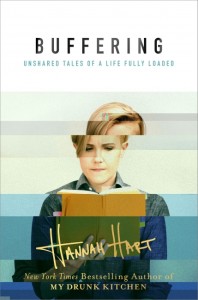Buffering: Unshared Tales of a Life Fully Loaded, by Hannah Hart. Dey Street Books, 2016. $24, 272 pages.
In the video announcing Buffering: Unshared Tales of a Life Fully Loaded, a very anxious and excited Hannah Hart tells her YouTube viewers “there’s a lot of really fun, repressed shit in there.” Hart has been open since the announcement of her second book that she held very little back in this collection of autobiographical essays, and the “Trigger Warning” introduction serves as the book’s only warning to readers about the tales she shares about her journey with mental illness, sexuality, faith, fame, drug use, and self-harm. Though the topics have become more openly acceptable to talk about as of late, Hart’s honesty, unique circumstances, and awareness of the privilege that comes with being “white, wealthy, educated, [and] famous,” add a new voice to the discussion.
Her ability to create a sense of familiarity, making it feel as though she’s speaking directly to the reader, much like she does in her YouTube videos, is the best part of her storytelling. She first began her career on YouTube as a way to cheer up a friend, but quickly went viral. She has built her channel, “MyHarto,” and its over 2.5 million subscribers by getting drunk, cooking, and giving life advice, often in the form of puns, for her series “My Drunk Kitchen” every week. It’s evident in her writing that the experience from her time on YouTube has aided in creating that ease in telling stories. In many ways, Buffering feels like a more personal extension of her videos.
Buffering opens at the beginning of Hart’s life. She recounts her experiences growing up in an incredibly low-income home with a mother struggling with schizophrenia. In a footnote, she comments, “We call the illness ‘Annette’ and the happy memories ‘Mom.’” She then goes on to reflect on her relationship with her father, a Jehovah’s Witness, and his impact on her coming to terms with her sexuality, as well as the lack of empathy shown to her and her sister from their father and step-mother.
Hart touches on many important relationships throughout her life—her relationship with her stepfather and half-sister, her first girlfriend, and her friendships with other YouTubers—but the most significant is her relationships with her sister, Naomi. Naomi is present in nearly every chapter of the book. In the final chapter, titled “Fables,” she shares several stories from their childhood in an attempt to depict just how vital they were in each others’ lives, and settles on telling a story about a general and a monk; siblings from a cataclysmic “Good-Bad Witch” who grow to lead vastly different lives, but ultimately need each other to save their mother. After sharing the story, Hart writes, “…we started calling each other the General and the Monk. It was our way of forgiving each other and understanding the adults we had to become: a General [Hannah] powered by passion, a Monk [Naomi] cultivating patience in the face of pain.”
Her stories, no matter how dark, are enriched with puns and the advantage of looking back on the tales with an older perspective. In the chapter “(Un)packing a Punch,” Hart opens up for the first time publicly about her struggles with self-harm. She explains how she would punch walls when she was angry, and though she’s now learned to deal with her anger, she still struggles sometimes. After acknowledging that a journey to be better includes occasional failures, she writes, “I can’t beat myself up for that. PUN INTENDED.”
Puns come up a lot in Hart’s content. Her YouTube videos, Tweets, Instagram posts, and both of her books are full of quips about social media, food, and the darker parts of life. She uses puns and comedy as a way of coping with and processing the traumas and hardships of her past, and though they might not suit every reader, they act as a balance to the difficult-to-stomach realities of life.
Buffering: Unshared Tales of a Life Fully Loaded, a pun itself, allows Hart to process the events of her childhood and gives her readers and viewers the opportunity to not feel alone. While her YouTube videos feel very personal, there’s a more emotional vibe about the book. The process of writing out such emotional tales is a more permanent way of release and processing, and that comes across well in Hart’s writing.
Hart uses these autobiographical essays to take the reader through her continuous journey of discovering who she is at thirty and how she navigates relationships, success, emotions, and the struggle to find boundaries while “operating in the age of the overshare.” The books ends with “Hannah’s List of Readings and References,” a list of resources that she has found helpful over the years, from self-help books to poetry, including I’m Not Sick I Don’t Need Help: How to Help Someone with Mental Illness Accept Treatment by Xavier Amador, Anger: Wisdom for Cooling the Flames by Thich Nhat Hanh, and Letters to a Young Poet by Rainer Maria Rilke.
The biggest take away is that without some boundaries and processing, it’s difficult to live a full life because, after all, “boundaries + processing = buffering.”
Samantha Capaldo is currently enrolled as an undergraduate at Loyola University New Orleans. Find her on Twitter @searchfornargls.

